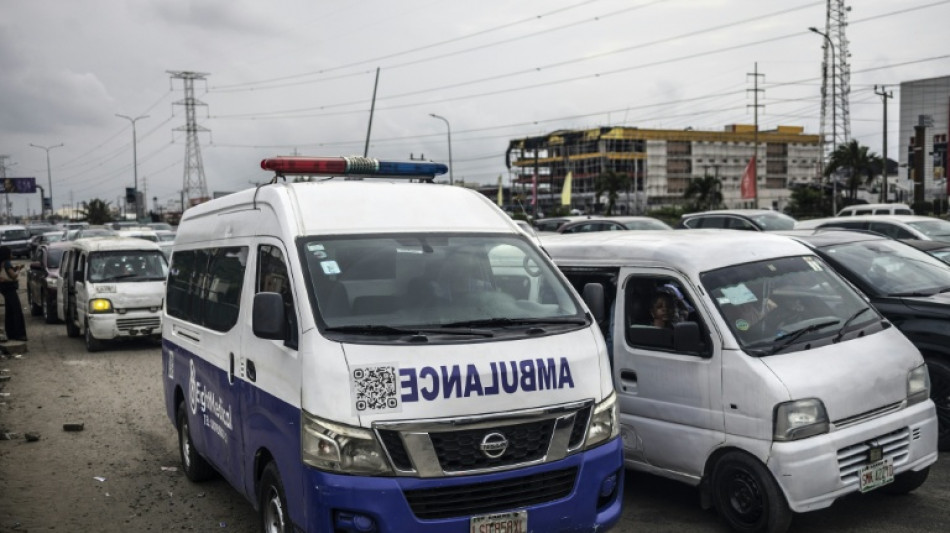
-
 Vonn to provide injury update as Milan-Cortina Olympics near
Vonn to provide injury update as Milan-Cortina Olympics near
-
France summons Musk for 'voluntary interview', raids X offices

-
 Stocks mostly climb as gold recovers
Stocks mostly climb as gold recovers
-
US judge to hear request for 'immediate takedown' of Epstein files

-
 Russia resumes large-scale strikes on Ukraine in glacial temperatures
Russia resumes large-scale strikes on Ukraine in glacial temperatures
-
Fit-again France captain Dupont partners Jalibert against Ireland

-
 French summons Musk for 'voluntary interview' as authorities raid X offices
French summons Musk for 'voluntary interview' as authorities raid X offices
-
IOC chief Coventry calls for focus on sport, not politics

-
 McNeil's partner hits out at 'brutal' football industry after Palace move collapses
McNeil's partner hits out at 'brutal' football industry after Palace move collapses
-
Proud moment as Prendergast brothers picked to start for Ireland

-
 Germany has highest share of older workers in EU
Germany has highest share of older workers in EU
-
Teen swims four hours to save family lost at sea off Australia

-
 Ethiopia denies Trump claim mega-dam was financed by US
Ethiopia denies Trump claim mega-dam was financed by US
-
Norway crown princess's son pleads not guilty to rapes as trial opens

-
 Russia resumes strikes on freezing Ukrainian capital ahead of talks
Russia resumes strikes on freezing Ukrainian capital ahead of talks
-
Malaysian court acquits French man on drug charges

-
 Switch 2 sales boost Nintendo profits, but chip shortage looms
Switch 2 sales boost Nintendo profits, but chip shortage looms
-
China to ban hidden car door handles, setting new safety standards

-
 Switch 2 sales boost Nintendo results but chip shortage looms
Switch 2 sales boost Nintendo results but chip shortage looms
-
From rations to G20's doorstep: Poland savours economic 'miracle'

-
 Russia resumes strikes on freezing Ukrainian capital
Russia resumes strikes on freezing Ukrainian capital
-
'Way too far': Latino Trump voters shocked by Minneapolis crackdown

-
 England and Brook seek redemption at T20 World Cup
England and Brook seek redemption at T20 World Cup
-
Coach Gambhir under pressure as India aim for back-to-back T20 triumphs

-
 'Helmets off': NFL stars open up as Super Bowl circus begins
'Helmets off': NFL stars open up as Super Bowl circus begins
-
Japan coach Jones says 'fair' World Cup schedule helps small teams

-
 Equities and precious metals rebound after Asia-wide rout
Equities and precious metals rebound after Asia-wide rout
-
Do not write Ireland off as a rugby force, says ex-prop Ross

-
 Winter Olympics 2026: AFP guide to Alpine Skiing races
Winter Olympics 2026: AFP guide to Alpine Skiing races
-
Winter Olympics to showcase Italian venues and global tensions

-
 Buoyant England eager to end Franco-Irish grip on Six Nations
Buoyant England eager to end Franco-Irish grip on Six Nations
-
China to ban hidden car door handles in industry shift

-
 Sengun leads Rockets past Pacers, Ball leads Hornets fightback
Sengun leads Rockets past Pacers, Ball leads Hornets fightback
-
Waymo raises $16 bn to fuel global robotaxi expansion

-
 Netflix to livestream BTS comeback concert in K-pop mega event
Netflix to livestream BTS comeback concert in K-pop mega event
-
Rural India powers global AI models

-
 US House to vote Tuesday to end shutdown
US House to vote Tuesday to end shutdown
-
Equities, metals, oil rebound after Asia-wide rout

-
 Bencic, Svitolina make history as mothers inside tennis top 10
Bencic, Svitolina make history as mothers inside tennis top 10
-
Italy's spread-out Olympics face transport challenge

-
 Son of Norway crown princess stands trial for multiple rapes
Son of Norway crown princess stands trial for multiple rapes
-
Side hustle: Part-time refs take charge of Super Bowl

-
 Paying for a selfie: Rome starts charging for Trevi Fountain
Paying for a selfie: Rome starts charging for Trevi Fountain
-
Faced with Trump, Pope Leo opts for indirect diplomacy

-
 NFL chief expects Bad Bunny to unite Super Bowl audience
NFL chief expects Bad Bunny to unite Super Bowl audience
-
Australia's Hazlewood to miss start of T20 World Cup

-
 Bill, Hillary Clinton to testify in US House Epstein probe
Bill, Hillary Clinton to testify in US House Epstein probe
-
Cuba confirms 'communications' with US, but says no negotiations yet

-
 Iran orders talks with US as Trump warns of 'bad things' if no deal reached
Iran orders talks with US as Trump warns of 'bad things' if no deal reached
-
From 'watch his ass' to White House talks for Trump and Petro


In mega-city Lagos, 20 million count on just 100 ambulances
Standing outside a public hospital in Lagos, Nigeria's biggest city, Michelin Hunsa is still "traumatised" from the two-hour wait it took to get an ambulance for her mother, found unconscious by her neighbours.
Such waits can be deadly and are not unusual in the mega-city, where notorious traffic jams snarl commutes and only about 100 ambulances serve a population of more than 20 million.
"It's a serious problem, we waited far too long," Hunsa, 25, told AFP. Her mother, suffering a cerebral haemorrhage, ultimately survived the ordeal.
Political and business big-wigs regularly bust through traffic in the largest city in west Africa with armed convoys and flashing lights -- despite not being in any actual emergency.
Ambulances blast sirens, take shortcuts and speed as fast as they can -- but sometimes to no avail.
Part of the problem stems from mistrust among other drivers, who are used to a state of quasi-war on the roads from frustrated commuters trying to get ahead.
"I'm sure most of the time they don't transport real emergency cases, that's why I don't move," said Anthony Folayinka, a 38-year-old ride share driver.
Queen Soetan, a 33-year-old ambulance driver, told AFP such sentiments were common.
"Most people will not just want to leave the road, so it does affect our intervention time," she said.
The government currently provides 35 ambulances, Olusegun Ogboye, permanent secretary to the Lagos state ministry of health, told AFP.
That number pads the 80 to 90 operated by companies but still leaves the city with a ratio of roughly one ambulance per 200,000 people -- far below recommended medical guidelines.
- Private companies, floating clinics -
Since its founding in 2021, Eight Medical has run 34 ambulances, day and night.
The name comes from medical experts' recommended response time for ambulances of eight minutes or less.
"In Lagos, we are still far from it, but that's the goal I want to reach with my team," said business founder Ibukun Tunde-Oni, a 36-year-old doctor.
He was motivated to start the service after the deaths of two uncles -- one of whom died from a heart attack and the other who died in an ambulance while having an asthma attack.
Tunde-Oni has had his own lacklustre experiences with ambulances as well, once having to wait for three hours to receive care after breaking his arm in a road accident.
No data is available on how many people have died waiting for an ambulance, or while ensnared in one of the city's infamous "go slows", as traffic jams are known.
But "100 ambulances for Lagos is not enough", Tunde-Oni told AFP.
And the city is only growing.
According to the University of Toronto's Global Cities Institute, Lagos is on track to become the most populated city in the world by 2100, with 88 million residents.
But public services have not kept up with the breakneck growth in Nigeria, already Africa's most populous country with more than 220 million people.
Successive governments have been accused of squandering the nation's vast oil wealth: even if there were more ambulances, they'd still have to contend with Lagos's many pockmarked and unpaved roads.
Those who make it to the hospital are treated in poor conditions and by underpaid staff.
Lack of coordination with hospitals means that ambulances don't always know which locations have open beds, Tunde-Oni added.
Authorities have also tried to get creative: with the city sitting on a massive lagoon, in 2022 they put in place a floating clinic and boat ambulance to serve the 15 to 20 communities on the water's edge, said Ibrahim Famuyiwa, a waterways official.
But lacking funds to expand the initiative, the priority remains increasing Lagos's traditional ambulances, mostly through public-private partnerships.
R.Halabi--SF-PST



